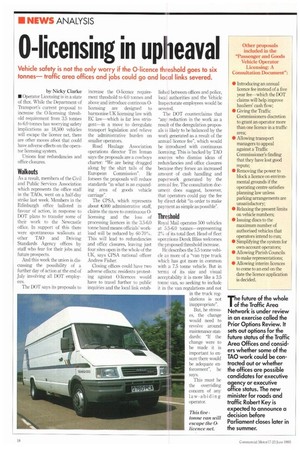0-licensing in upheaval
Page 20

If you've noticed an error in this article please click here to report it so we can fix it.
Vehicle safety is not the only worry if the 0-licence threshold goes to six tonnes— traffic area offices and jobs could go and local links severed.
by Nicky Clarke • Operator Licensing is in a state of flux. While the Department of Transport's current proposal to increase the 0-licensing threshold requirement from 35 tonnes to 6.0 tonnes has worrying safety implications as 18,500 vehicles will escape the licence net, there are other moves afoot that could have adverse effects on the operator licensing system.
Unions fear redundancies and office closures.
Walkouts
As a result, members of the Civil and Public Services Association which represents the office staff in the TA0s, went on a half-day strike last week. Members in the Edinburgh office balloted in favour of action, in response to DOT plans to transfer some of their work to the Newcastle office. In support of this there were spontaneous walkouts at other TAO and Driving Standards Agency offices by staff who fear for their jobs and future prospects.
And this week the union is discussing the possibility of a further day of action at the end of July involving all DOT employees.
The DOT says its proposals to increase the 0-licence requirement threshold to 6.0 tonnes and above and introduce continous 0licensing are designed to harmonise UK licensing law with EC law—which is far less stringent—in a move to deregulate transport legislation and relieve the administrative burden on smaller operators.
Road Haulage Association operations director Tim Inman says the proposals are a cowboys charter: "We are being dragged along by the shirt tails of the European Commission". He forsees the proposals will reduce standards "in what is an expanding area of goods vehicle carriage".
The CPSA, which represents about 4,000 administrative staff, claims the move to continuous 0licensing and the loss of processing licences in the 3.5-6.0 tonne band means officials' workload will be reduced by 60-70%. This will lead to redundancies and office closures, leaving just four sites open in the whole of the UK, says CPS'A national officer Andrew Fisher.
Closing offices could have two adverse effects: residents protesting against 0-licences would have to travel further to public inquiries and the local link estab
lished between offices and police, local authorities and the Vehicle Inspectorate employees would be severed.
The DOT counterclaims that "any reduction in the work as a result of the deregulation proposals is likely to be balanced by the work generated as a result of the annual licence fee", which would be introduced with continuous licensing. This is backed by TAO sources who dismiss ideas of redundancies and office closures because they forsee an increased amount of cash handling and paperwork generated by the annual fee. The consultation document does suggest, however, that operators could pay the fee by direct debit "in order to make payment as simple as possible".
Threshold
Royal Mail operates 500 vehicles at 5.5-6.0 tonnes—representing 2% of its total fleet. Head of fleet operations Derek Bliss welcomes the proposed threshold increase.
He describes the 5.5 tonne vehicle as more of a "van type truck which has got more in common with a 7.5 tonne vehicle. Rut in terms of its size and visual acceptability it is more like a 3.5 tonne van, so seeking to include it in the van regulations and not in the truck regulations is not inappropriate".
But, he stresses, the change would need to revolve around maintenance standards: "If the change were to be made it is important to ensure there would be adequate enforcement", he says.
This must be the overriding concern of any law-abiding operator.
The future of the whole of the Traffic Area Network is under review in an exercise called the Prior Options Review. It sets out options for the future status of the Traffic Area Offices and considers whether some of the TAO work could be contracted out or whether the offices are possible candidates for executive agency or executive office status. The new minister for roads and traffic Robert Key is expected to announce a decision before Parliament closes later in the summer. Other proposals included in the "Passenger and Goods Vehicle Operator Licensing: A Consultation Document": • Introducing an annual licence fee instead of a five year fee—which the DOT claims will help improve hauliers' cash flow; • Giving the Traffic Commissioners discretion to grant an operator more than one licence in a traffic area;
• Allowing transport managers to appeal against a Traffic Commissioner's finding that they have lost good repute;
• Removing the power to block a licence on environmental grounds if the operating centre satisfies planning law unless parking arrangements are unsatisfactory; • Relaxing the present limits on vehicle numbers; • Issuing discs to the maximum number of authorised vehicles that operators intend to run; • Simplifying the system for own-account operators; • Allowing Parish Councils to make representations; • Allowing interim licences to come to an end on the date the licence application is decided.
















































































